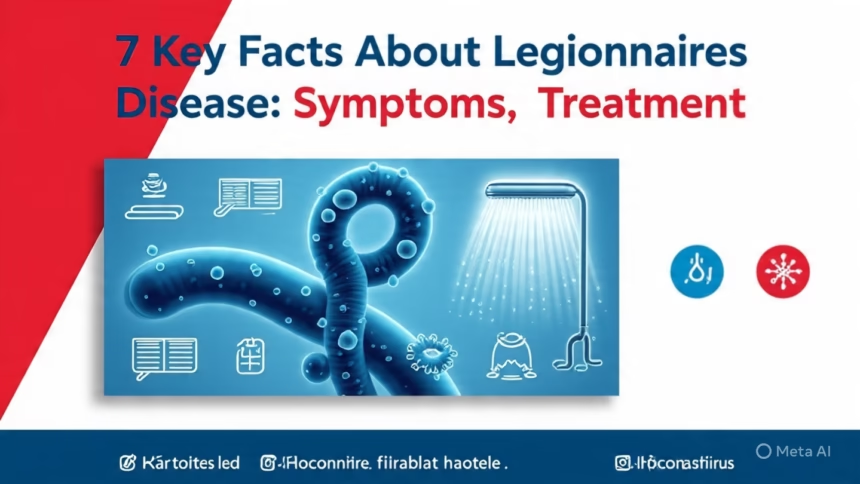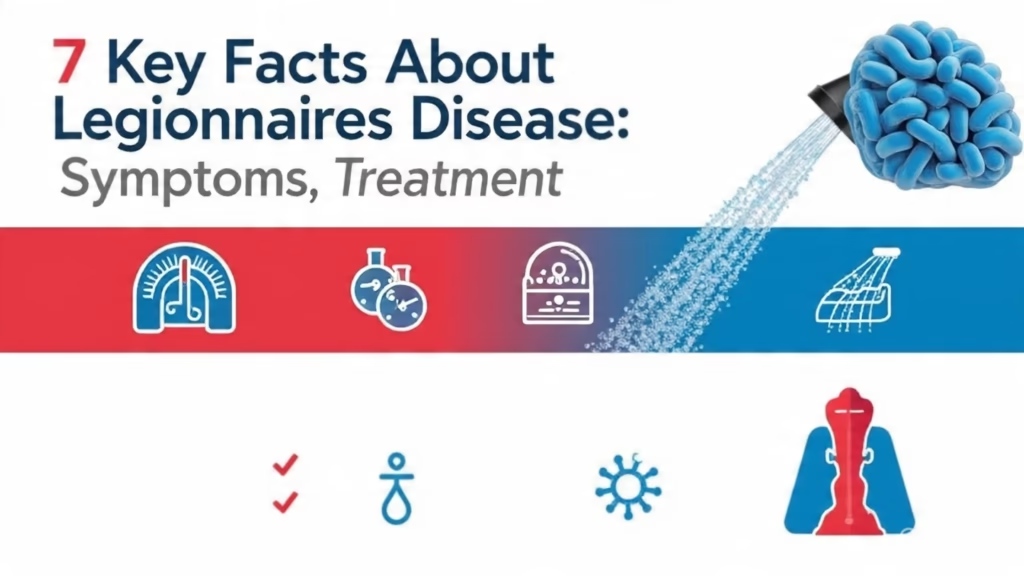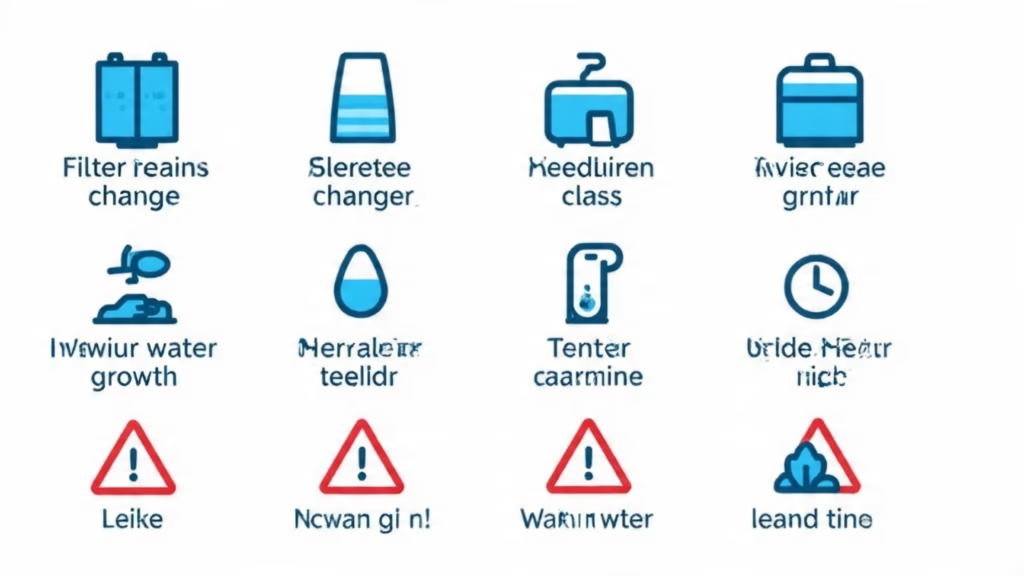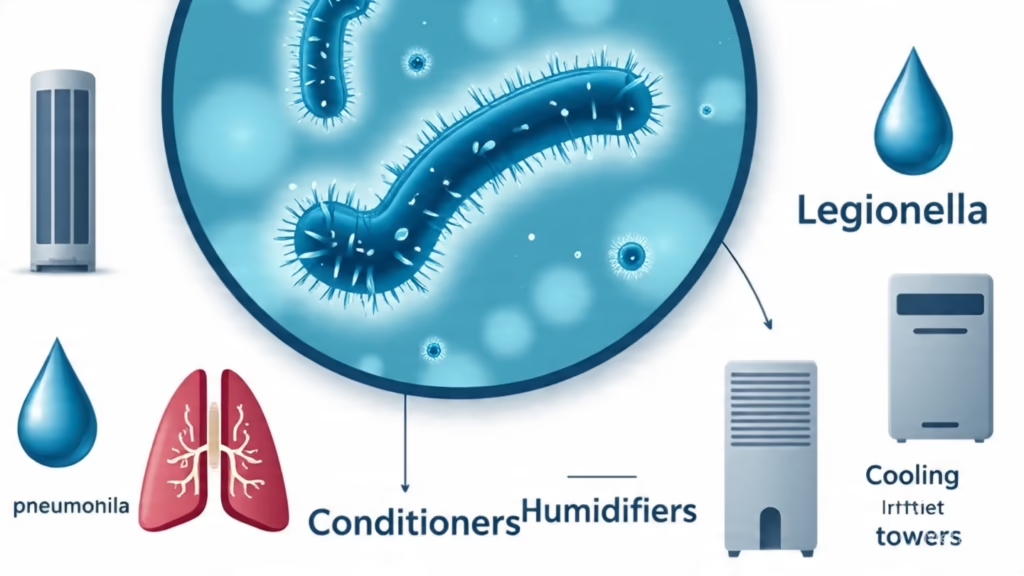INTRODUCTION:Legionnaires Disease
Legionnaires Disease is a serious form of pneumonia caused by Legionella bacteria, often linked to contaminated water systems like air conditioners and humidifiers. Understanding its symptoms, transmission routes, prevention, and treatment is crucial, especially when distinguishing it from other illnesses such as COVID-19 or brucellosis. This comprehensive guide covers frequently asked questions about Legionnaires Disease, water safety, air quality, humidifiers, air conditioners, and related health concerns to help you stay informed and protected.
Thank you for reading this post, don't forget to subscribe!FAQs About Legionnaires Disease
1. Is Legionnaires’ disease fatal? How do you treat it?Legionnaires Disease can be fatal, especially in elderly or immunocompromised people. Early treatment with antibiotics such as macrolides or fluoroquinolones is crucial. Hospitalization may be required for severe cases to manage breathing difficulties. Without timely treatment, the disease can lead to pneumonia and death.
2. Is Legionnaires disease the same as COVID-19?
No, Legionnaires Disease is caused by Legionella bacteria, while COVID-19 is caused by the SARS-CoV-2 virus. Both cause respiratory symptoms like cough and fever but are different diseases with different treatments. Legionnaires Disease spreads through contaminated water droplets, whereas COVID-19 spreads mainly via respiratory droplets.
3. What are ways of getting Legionnaires’ disease?
Legionnaires Disease is acquired by inhaling aerosolized water droplets contaminated with Legionella bacteria. Common sources include cooling towers, hot tubs, showers, and fountains. It does not spread from person to person. Risk increases with exposure to poorly maintained water systems.
4. What is Legionnaires’ disease and does it still exist?
Legionnaires Disease is a severe pneumonia caused by Legionella bacteria. It still exists worldwide and causes outbreaks linked to contaminated water systems. Proper water management and hygiene are essential to reduce risk, but the bacteria remain present in many man-made water environments.
5. Does boiling water kill Legionella?
Yes, boiling water kills Legionella bacteria effectively. Water temperatures above 70°C (158°F) are lethal to the bacteria, making boiling an effective disinfection method to reduce the risk of Legionnaires Disease in contaminated water supplies.
6. Why is Legionnaires’ not eradicated by now?
Legionnaires Disease persists because Legionella bacteria thrive in warm, stagnant water found in many man-made systems like cooling towers and plumbing. Eradication is difficult due to bacteria’s ability to survive in biofilms and resist common disinfectants in low concentrations.
7. What is Legionella Pneumophila?
Legionella Pneumophila is the primary bacterial species responsible for Legionnaires Disease. It thrives in warm aquatic environments and infects humans via inhalation of contaminated aerosols. It causes severe pneumonia and sometimes a milder illness called Pontiac fever.
8. Can you get Legionnaires disease from wearing a mask?
No, Legionnaires Disease is not transmitted by masks. It spreads by breathing in water droplets contaminated with Legionella bacteria. Wearing masks does not increase risk and can help prevent viral infections but does not affect Legionella transmission.
9. What you need to know about Legionella Risk Assessment?
Legionella Risk Assessment evaluates water systems for conditions that promote Legionnaires Disease bacteria growth. It identifies sources of contamination and outlines control measures like temperature control and disinfection to prevent outbreaks.
10. New Legionella Guidelines?
New Legionella guidelines emphasize routine risk assessments, maintaining water temperatures outside Legionella’s growth range, regular cleaning of water systems, and monitoring bacterial levels to minimize Legionnaires Disease risk.
11. What is the purpose of Legionella testing? How does it test?
Legionella testing detects the bacteria in water samples to prevent Legionnaires Disease outbreaks. Methods include culturing bacteria on selective media or molecular tests like PCR to identify contamination early and guide remediation.
12. What are the symptoms of Legionella disease?
Symptoms of Legionnaires Disease include high fever, cough, muscle aches, headaches, and shortness of breath. Symptoms appear 2 to 10 days after exposure and resemble pneumonia, often requiring medical attention for proper diagnosis and treatment.
13. Do air conditioners spread viruses?
Air conditioners do not spread viruses directly but poorly maintained systems can circulate contaminated air and water droplets, potentially spreading Legionella bacteria responsible for Legionnaires Disease.
14. Water and Legionella Risk Management Plans?
Legionella Risk Management Plans involve controlling water temperature, regular cleaning, disinfection, and monitoring water systems to reduce Legionnaires Disease risk. These plans help maintain safe water environments.
15. Is waste water from an air conditioner safe to drink?
No, wastewater from air conditioners can harbor Legionella and other harmful bacteria, making it unsafe for drinking or other consumption.
16. Can an air conditioner make you sick?
Yes, if not properly maintained, air conditioners can spread Legionella bacteria, leading to Legionnaires Disease or respiratory irritation from dust and molds.
17. Can showerheads cause infections?
Yes, contaminated showerheads can harbor Legionella bacteria, potentially causing Legionnaires Disease if inhaled in aerosol form.
18. Can you get diseases from swimming in hotel pools?
Yes, poorly maintained pools can spread infections including Legionnaires Disease if Legionella bacteria contaminate the water or aerosolized mist.
19. How do diseases spread through water?
Waterborne diseases like Legionnaires Disease spread by inhaling or ingesting contaminated water containing bacteria, viruses, or parasites, especially in aerosols from showers or cooling systems.
20. Can I drink the water that the air conditioner produces?
No, air conditioner condensate water is not safe to drink and may contain Legionella bacteria and other contaminants.
21. Does rainwater contain germs?
Rainwater can contain bacteria, viruses, and other microorganisms including Legionella if collected in contaminated environments.
22. Is the water that leaks from AC harmful?
AC leak water may contain Legionella bacteria and other contaminants, posing a health risk if inhaled or ingested.
23. Is AC drain water good for drinking?
No, AC drain water is unsafe for drinking due to potential bacterial contamination, including Legionella.
24. What will happen if I drink air conditioning water?
Drinking AC water can lead to gastrointestinal illness or infections like Legionnaires Disease due to bacterial contamination.
25. Can A/C water be used as distilled water?
No, AC water is not purified or distilled and may contain harmful bacteria including Legionella.
26. Can you put water in windshield wiper fluid?
Yes, but plain water can freeze or smear; proper windshield washer fluid with additives is recommended for safety.
27. What is a good temperature for a heater?
Maintaining water heaters at 120°F (49°C) helps prevent Legionella growth, reducing Legionnaires Disease risk.
28. Should people turn off the water valve before a vacation?
Turning off water valves can prevent leaks, but water systems should be flushed before and after vacations to avoid Legionnaires Disease bacteria buildup.
29. Can you use hot water from a furnace heat exchanger?
Hot water from furnace heat exchangers is meant for heating, not for consumption or bathing, and may carry Legionella risk if not properly maintained.
30. What is the most popular face mask for disease protection?
N95 masks are effective for airborne viruses but do not protect against Legionnaires Disease, which is waterborne.
31. How does Flint, MI still not have water?
Flint’s crisis is due to lead contamination and infrastructure issues, unrelated to Legionnaires Disease but highlighting risks of poor water management.
32. Does monkeypox easily spread in an air-conditioned room?
Monkeypox mainly spreads through close contact, not specifically via air conditioning systems.
33. Can you get necrotizing fasciitis from tap water?
While rare, contaminated tap water can cause necrotizing fasciitis if bacteria enter wounds.
34. Is sediment in a hot water tank dangerous?
Sediment can harbor Legionella bacteria, increasing Legionnaires Disease risk if water temperature is not maintained above 120°F.
35. Can you inhale a humidifier with water only?
Inhaling mist from contaminated humidifiers can cause Legionnaires Disease if Legionella bacteria are present in the water.
36. Is the water that I pour out of my dehumidifier safe to drink?
No, dehumidifier water is not potable and can contain Legionella bacteria.
37. Is it ok to refill windshield wiper fluid with water?
Yes, but water alone may freeze; additives are safer for winter and cleaning efficiency.
38. How to change the temperature on your water heater?
Adjust the thermostat dial near the tank, aiming for 120°F to control Legionella growth and save energy.
39. Can not changing your water filter make you sick?
Yes, dirty filters can harbor Legionella bacteria, raising Legionnaires Disease risk.
40. How to turn off a gas water heater for a vacation?
Turn off the gas supply and power to prevent leaks and bacterial growth during absence.
41. What is meant by the surface temperature of a heater?
It refers to how hot the heater’s outer surface gets, important for safety to avoid burns.
42. What happens if you put too much bleach in a well?
Excess bleach can contaminate water supplies, but proper use kills Legionella bacteria in wells.
43. Can you get pneumonia leaving a humidifier on too long?
Yes, if the humidifier water contains Legionella bacteria, it can cause Legionnaires Disease, a type of pneumonia.
44. Is chlorine in drinking water healthy?
Chlorine controls Legionella and other pathogens but excessive chlorine can have negative health effects.
45. Is it bad to turn off the water while on vacation?
Turning water off prevents leaks, but flushing pipes before and after helps reduce Legionnaires Disease risk.
46. Is it unsanitary to use public air hand dryers?
Hand dryers don’t spread Legionnaires Disease but may spread other bacteria or viruses if dirty.
47. How long can a pool of water be safely left stagnant?
Stagnant water can grow Legionella bacteria within days, increasing Legionnaires Disease risk.
48. Is Brucellosis infection the same symptoms as COVID-19?
Brucellosis and COVID-19 have some overlapping symptoms like fever, fatigue, and muscle aches, but they are caused by different pathogens—Brucellosis is bacterial, COVID-19 viral. Legionnaires Disease symptoms can also resemble flu and pneumonia but differ in cause and treatment. Proper diagnosis is essential to distinguish these illnesses.
49. Can you get pneumonia leaving a humidifier on too long?
Yes, if a humidifier uses contaminated water, it can harbor Legionella bacteria that cause Legionnaires Disease, a form of pneumonia. Using clean, distilled water and regularly cleaning the humidifier reduces this risk.
50. Is it harmful to breathe in vapor mist from a humidifier?
Breathing pure water vapor from a clean humidifier is usually safe. However, if the water contains Legionella bacteria or molds, inhaling the mist can cause Legionnaires Disease or respiratory irritation.
51. Can a portable air conditioner make you sick?
A poorly maintained portable air conditioner can spread Legionella bacteria or molds, increasing the risk of Legionnaires Disease or allergic reactions. Regular cleaning and filter changes help prevent this.
52. Is it bad to inhale water vapor from a humidifier?
Inhaling clean humidifier vapor is not harmful. However, contaminated water vapor can contain Legionella bacteria causing Legionnaires Disease or trigger asthma and allergies.
53. Can a humidifier cause flu-like symptoms?
Yes, if contaminated with Legionella or other pathogens, a humidifier can spread bacteria causing flu-like symptoms consistent with Legionnaires Disease.
54. Can an air conditioner make you sick?
Yes, if contaminated with Legionella bacteria or molds, air conditioners can cause respiratory illnesses including Legionnaires Disease.
55. Can you get sick from a fan blowing on you at night?
Fans themselves do not cause illness but blowing air may dry out mucous membranes, potentially making you more susceptible to infections. Fans do not spread Legionnaires Disease.
56. Can you get sick from air conditioning blowing on you?
Direct air conditioning airflow does not cause Legionnaires Disease but can spread Legionella bacteria if the system is contaminated. Proper maintenance reduces risks.
57. Can you inhale a humidifier with water only?
Yes, inhaling mist from a humidifier filled with clean water is generally safe, but if the water is contaminated with Legionella bacteria, it can cause Legionnaires Disease.
58. Will using air coolers lead to catching a cold?
Air coolers can dry out nasal passages, making one prone to viral infections like colds, but they do not cause bacterial infections like Legionnaires Disease unless contaminated.
59. Why do Turkish people say the AC makes you sick?
In some cultures, including Turkish, people believe cold air or AC causes illness. While AC does not cause infection directly, poor maintenance may spread Legionella bacteria or allergens causing respiratory problems.
60. Does air conditioning make you feel sick?
Yes, if AC systems are dirty or poorly maintained, they can spread allergens or Legionella bacteria, causing symptoms like headaches, respiratory irritation, or Legionnaires Disease.
61. Which is better, a humidifier or a vaporizer, for congestion?
Both help relieve congestion by adding moisture. Vaporizers use warm mist and may kill bacteria; humidifiers release cool mist. Clean devices reduce Legionnaires Disease risk.
62. Is it possible to get sick from Air conditioning?
Yes, contaminated air conditioning systems can harbor Legionella bacteria leading to Legionnaires Disease or trigger allergies and respiratory irritation.
63. What is a nebulizer? What is a cool mist humidifier?
A nebulizer delivers medication as a fine mist for lung diseases; a cool mist humidifier adds moisture to the air to ease congestion. Neither causes Legionnaires Disease unless contaminated with bacteria.
64. Is humidifier mold dangerous?
Yes, mold in humidifiers can trigger allergies, asthma, and respiratory infections, including risks of Legionnaires Disease if Legionella bacteria are present.
65. Can dirty air conditioner filters make you sick?
Yes, dirty filters can accumulate bacteria and mold, spreading Legionella bacteria that cause Legionnaires Disease or other respiratory illnesses.
66. Can a human catch a cold because of an air conditioner?
Cold air itself doesn’t cause colds, but dry, cold air from AC can dry mucous membranes making viral infections easier to contract.
67. What is the use of a warm mist humidifier?
Warm mist humidifiers produce steam to add moisture and kill some bacteria. They may reduce Legionnaires Disease risk compared to cool mist humidifiers if properly maintained.
68. Is the air conditioner’s air good for your health?
Clean, well-maintained air conditioners can improve air quality, but poorly maintained units may spread Legionella bacteria causing Legionnaires Disease or allergens causing respiratory problems.
69. When should I use a cool-mist humidifier versus a warm?
Use cool mist in warm climates or for children; warm mist in cold climates or for respiratory relief. Both can pose Legionnaires Disease risk if water is contaminated.
70. Can air conditioning make cats or dogs sick?
Poorly maintained AC can circulate allergens or bacteria but pets are less susceptible to Legionnaires Disease. However, they can suffer from respiratory irritation.
71. Can Covid-19 spread through central air conditioners?
Central AC can recirculate air but is not a primary transmission route for COVID-19. Proper filtration reduces risk. Legionnaires Disease is unrelated and caused by bacteria in water systems.
72. Which is better for a baby, cool mist or warm mist humidifier?
Cool mist humidifiers are safer for babies to prevent burns. Both types require regular cleaning to prevent Legionnaires Disease risk.
73. Can you be allergic to air conditioning?
Yes, some people develop allergies to dust, molds, or bacteria in poorly maintained AC systems.
74. What are the symptoms of brucellosis?
Brucellosis causes fever, sweats, fatigue, muscle pain, and joint pain, which can overlap with symptoms of Legionnaires Disease but require different treatment.
75. Can’t changing your furnace filter make you sick?
Failing to change filters can spread dust, mold, and Legionella bacteria leading to respiratory illnesses like Legionnaires Disease.
76. How to make a cheap homemade humidifier?
Using a bowl of water near a fan or radiator can increase humidity but risks contamination if water is stagnant, potentially increasing Legionnaires Disease risk.
77. Does using a humidifier give you a sore throat? If so, why?
If the humidifier water is contaminated or overused, it can cause sore throat from irritation or infection with bacteria like Legionella causing Legionnaires Disease.
78. Which is better for asthma, a humidifier or a dehumidifier?
Depends on humidity level; humidifiers add moisture which can help dry air but may promote Legionnaires Disease if contaminated; dehumidifiers reduce excess moisture to prevent mold growth.
79. Why does the car AC give me dry nose and sinus problems?
Car AC dries out nasal passages causing irritation and congestion, but does not cause Legionnaires Disease unless contaminated water is involved.
80. Is it harmful to stay in AC for the whole day?
Prolonged exposure to poorly maintained AC can spread Legionella bacteria or allergens causing Legionnaires Disease or respiratory issues.




